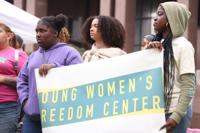
This Diálogo was organized in response to the challenges and increasing threats of the President Donald Trump administration against newsrooms. Photo by Markus Winkler
On Thursday, CALÓ News and the Latino Media Collaborative (LMC) hosted the 8th Diálogo session titled “Voices Silenced: Media Censorship in the Second Trump Administration” where journalists, media rights advocates, attorneys, philanthropists and community members gathered to talk about how newsrooms have been affected by media censorship, violations of the First Amendment and threats to freedom of the press.
”Collectively, [LMC] is working to transform the media landscape by uplifting diverse voices, providing capacity, building support for newsrooms and creating opportunities for direct funding, joint media projects and innovative storytelling, ” Esperanza Guevara, LMC’s managing director , said in the event's opening statement. “ Today's Diálogo is part of a regular series and it's meant to be a space for discussion within our community on the most pressing issues.”
This Diálogo, the first one of the year, was organized in response to the challenges and increasing threats of the President Donald Trump administration against newsrooms and the news industry, which he has referred to as “the enemy of the people.”
After referencing Trump’s expressed desire to revisit the "actual malice" standard established in the landmark 1964 Supreme Court case New York Times v. Sullivan, which establishes that public officials must prove actual malice to win a defamation lawsuit against a media outlet, L.A. Times columnist Gustavo Arellano said the president has had an ongoing acrimonious relationship with the news media.
“ The media has always had an issue with censorship. This is not anything new, but we are now under an administration that has, as one of its many goals, frankly one of its priorities, to loosen media libel laws so that the press has to look over their shoulder even more often than not,” Arellano said.
First Amendment concerns have also increased rapidly among newsrooms and local news initiatives. Last month, the Trump administration barred the Associated Press from entering the Oval Office, which is considered the president's formal workspace. The blockage of the AP came after the news agency used the term “Gulf of Mexico,” which the president had ordered renamed the “Gulf of America.”
As the Diálogo emphasized, this is just one of the many examples of the recent threats to media censorship and democratic values of freedom of speech.
Jessica Gonzalez of Free Press, an organization focused on media advocacy issues including saving net neutrality, achieving affordable internet access and uplifting the voices of people of color in the media, was one of the four panelists at Thursday’s virtual event. Among many other topics, she talked about the importance of advancing policy efforts that defend press freedom, strengthen local journalism and protect public and community media.
“I really admire everything that journalists are doing right now because it's an extremely difficult climate,” Gonzalez said. “We have the president of the United States calling the press the enemy of the people, ejecting the AP from the White House… we have academics and activists being deported because of their First Amendment-protected rights to speak out against the government. Do not give in. Do not obey in advance. You are not going to buy your way into favor with this [administration]. The only way that we hold the line on democracy is if we protest, if we refuse to acquiesce to what's going on.”
Ben Camacho was also one of the featured speakers at Thursday’s event. Camacho, a multi-award-winning investigative journalist and documentary photographer, has reported on state-sponsored violence and the communities impacted by it. He shared his experience as a journalist after being sued twice by the City of Los Angeles in a failed effort to censor public records.
Camacho explained that, as part of a settlement agreement in a public records lawsuit, the city of Los Angeles provided journalist Ben Camacho with information about thousands of Los Angeles Police Department officers, including photograph headshots.
“ At the time I was doing some investigative work for Knock LA and I found myself watching videos of people who would go out and film police officers on the street doing their job. And I noticed this pattern where LAPD officers were essentially resisting people's cameras or attempts to have themselves identified. That ultimately led to a public records request that I filed and then had to sue the city to enforce ultimately,” he said. “The result of that was, I received the roster of the LAPD officers as well as their headshot photographs. This roster and the photographs I helped publish, along with the STOP LAPD Spying Coalition, who published the first database, essentially give access to the public of who precisely works at the LAPD [and] their yearly salary. But the most powerful aspect of the database was the photograph because it's the first time that we can all see who is patrolling the streets.”
He then explained that the city sued both Camacho and the coalition to reclaim headshots and other records based on the argument that there were undercover police officers whose information was mistakenly given to him.
The initial lawsuit sought to claw back the photographs and get the STOP LAPD Spying Coalition website taken down. Tawsuit demanded Camacho and the coalition pay for any judgment or settlement owed to the anonymous cops.
Camacho said the implications of this case made him realize the great attack on the First Amendment often comes directly from the government. He took it a step further to suggest that “the government has always, in some way or another, tried to chip away at this First Amendment.”
“The attacks that we've been seeing are coming from not just this administration but the previous administration, who laid the groundwork for what we're seeing nowadays,” he said, giving the example of the 2024 targeted violence against journalists who reported on protests against Israeli real estate sales in L.A., where journalists were attacked, harassed and had their equipment damaged or stolen. “Biden conflated the violence that happened to due to anti-Semitism and didn't even call out the fact that reporters were attacked and targeted. I feel like this kind of pattern that we're seeing. Now it’s just Trump taking this a step further.”
Michelle Zacarias, a CALÓ News reporter, also participated in the panel discussion. The award-winning journalist is a 2023-25 UC Berkeley Local News Fellow and formerly taught at USC’s Annenberg School for Communication and Journalism. Zacarias talked about the role media organizations play in resisting censorship and defending free speech and the way journalists fulfill their role as public servants and advocate for truth-telling and empower communities.
She said these are important topics and conversations that need to be addressed “head-on” in newsrooms. “ We cannot empower communities without, first and foremost, re-establishing trust with our audiences. Right now there is a deep fracture in the relationship between media and the general public,” she said.
Zacarias, who has been reporting on Latinx issues, anti-racism movements, queer identities, marginalized communities and abolition, said the relationship between media and people has been fractured due to many contributing factors, including the overreporting of crisis, which leads to news fatigue and the way that media plays a role in the larger propaganda machine.
“ Regardless of whether we're in a small newsroom or a large newsroom, we [must ask] ourselves, are we over-reporting on crisis? Is this news coverage reactionary or are we also providing solutions journalism? Are we also showcasing how, at a local level, people are fighting back against these harmful policies that are being enacted?” she said. “ We can't have a functioning democracy without government transparency. And so we, as journalists, are an extension of that.”
Deborah Drooz, an attorney and adjunct professor at Southwestern Law School, was also one of the speakers of this month's Diálogo. She has successfully argued matters and obtained favorable litigation outcomes for public figures and corporate clients, including the Anschutz Entertainment Group, Berry Gordy, Aretha Franklin, Martha Stewart, David LaChapelle, Steve Wynn and others.
Drooz touched on the importance of newsrooms in providing educational and legal rights resources to their reporters. She began by talking about shield laws, which she said in many states protect journalists from being forced to disclose confidential sources or unpublished information in legal proceedings. It provides a privilege, allowing reporters to refuse to reveal sources or information obtained during newsgathering.
“Newsrooms should offer meetings among reporters in which their legal rights and potential liabilities are discussed and their potential defenses are also discussed,” she said. “You shouldn't be learning about these defenses for the first time when somebody sues you.”
She said some of the newsroom's best practices are when they hire attorneys who can educate journalists on their rights. “I urge every editor and chief to take advantage of that practice because an ounce of preparation is worth [a lot],” she said.
As an attorney, she also advised journalists to practice their professions but look out for themselves at the same time. “ Be careful: as reporters, we want you to tell the truth, but we don't want you to close a news organization down,” she said. “Talk to your editors, keep in touch with your editors, and keep a good story file. If you have a confidentiality agreement with one of your sources, be sure that the terms of that agreement are clear and nobody's going to come back and sue you for breach of a confidentiality agreement.”
Last but not least, Anna M. Gomez, a commissioner of the Federal Communications Commission, was the guest speaker of the event. She was sworn in in September 2023 with over 30 years of experience in communications, law, and policy. She said censorship and violations of the First Amendment have been top issues for her in the last couple of months as a Democratic commissioner at the FCC, the nation's federal expert agency on communications, technology, radio, telephone, television, cable, satellites and the internet.
He talked about how the Trump administration, through the FCC, has targeted the editorial decisions of news networks, independent reporting and public media.
She referenced how FCC Chair Brendan Carr reinstated complaints against TV stations owned by CBS, ABC and NBC that the commission had previouslydismissed. The Center for American Rights (CAR), a conservative legal group, has pursued several legal actions alleging the networks violated the federal equal airtime statute for political candidates and the FCC’s policy on news distortion. The FCC does not have the authority to regulate news networks directly, only individual broadcast TV stations, a portion of which are owned by the networks.
“Censorship, plain and simple,” she said. “Experts across the ideological spectrum agree that these are dangerous and unprecedented actions by a leading government regulator. These actions threaten a free and independent press, undermine the First Amendment's free speech protections, and exert undue pressure that compromises the autonomy of private companies.”
As a closing statement, many of the speakers encouraged community members to read, support and invest in local media outlets and the journalists they admire and trust. “We care about our community; let's care about the people who are covering our communities,” Arellano said, referring to journalists.
For additional information on the Diálogo Series and if you would like to donate to LMC's effort to advance an informed and highly engaged Latino community through a thriving Latino media sector, visit latinomedia.org.











(0) comments
Welcome to the discussion.
Log In
Keep it Clean. Please avoid obscene, vulgar, lewd, racist or sexually-oriented language.
PLEASE TURN OFF YOUR CAPS LOCK.
Don't Threaten. Threats of harming another person will not be tolerated.
Be Truthful. Don't knowingly lie about anyone or anything.
Be Nice. No racism, sexism or any sort of -ism that is degrading to another person.
Be Proactive. Use the 'Report' link on each comment to let us know of abusive posts.
Share with Us. We'd love to hear eyewitness accounts, the history behind an article.